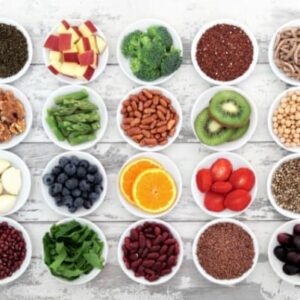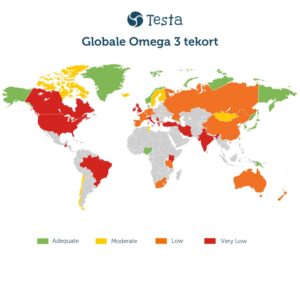
How to Get Omega-3s As a Vegan
If you pay attention to your diet and try to eat healthy, you’ve likely heard of omega-3 fatty acids. Studies on omega-3s show their numerous, and powerful, health benefits.
So how does your body benefit from omega-3 fatty acids? Can people following a vegan diet get enough omega-3s? How much is enough? You might be thinking fatty fish like tuna and salmon are the only sources of these powerhouse fatty acids. Do plants even contain omega-3s?
Find your answers below!
What are Omega-3 Fatty Acids?
When someone refers to “healthy fats”, they’re usually talking about omega-3 fatty acids. Omega-3s are polyunsaturated fats that help your body absorb vitamins and nutrients needed for healthy functioning. They help the body form cell membranes, provide energy, and are used to form eicosanoids, signaling molecules that play key roles in the cardiovascular, pulmonary, immune, and endocrine systems.
There are 3 main types of omega-3 fatty acids; alpha-linolenic acid (ALA), eicosapentaenoic acid (EPA), and docosahexaenoic acid (DHA). These fatty acids, and especially the combination of the three, carry out vital functions in our bodies.
ALA is an essential fatty acid; your body can’t make it on its own so you have to get it from foods. We can convert ALA into DHA and EPA but this isn’t a very efficient process so it’s important to make sure you’re getting enough preformed DHA and EPA in your diet.
Why Are Omega-3 Fatty Acids Important for Vegans?
Getting enough omega-3 fatty acids on a vegan diet is essential for long-term wellness. These fatty acids play a key role in supporting brain function, eye health, mood regulation, heart health, and even inflammation control. Unfortunately, many plant-based diets are high in omega-6s but low in omega-3s—this imbalance can lead to issues if not corrected.
For vegans especially, understanding how to meet your needs through omega-3 fatty acids vegan options can help bridge any nutritional gaps. The good news? It’s totally achievable with a bit of knowledge and a few daily habits.
Sources of Omega-3 Fatty Acids for Vegans
ALA is easy to find in plant foods. Men need about 1.6g of ALA omega-3s a day, while women need 1.1g, and these amounts are easy to cover on a vegan diet. Unfortunately, DHA & EPA can be a bit trickier to come across, especially for vegans. But don’t worry, we’ll tell you how you can incorporate these super-important fatty acids into your diet! First, let’s have a quick look at the plant-based sources of ALA.
Sources of Alpha-Linolenic Acid (ALA) for Vegans
Chia Seeds
Chia seeds are a rich source of ALA, with the essential fatty acid making up about half of the total content. Just one tablespoon of chia seeds provides 1.32g of ALA.
Flaxseed
Flaxseed is another great source of ALA. One tablespoon of flaxseed oil contains 7.26 grams of ALA, and one tablespoon of ground flax contains 2 grams of omega-3.
Walnuts
Walnuts are the only tree nut that provides a sufficient amount of ALA. Just one ounce contains 2.5 grams. That means one handful of walnuts is more than enough to fulfill your daily need!
Sources of DHA & EPA for Vegans
Fish are a rich source of DHA and EPA omega-3 fatty acids. But what if you’re vegan? Or, what if you want to protect our oceans and their biodiversity? We’ve got good news for you! The reason fish are such a great source of omega-3s is because they eat algae, the best direct plant-based source of DHA and EPA.
Almost everyone has heard of fish oil supplements. But did you know there are options for vegans too? Algae oil supplements, such as our Testa Algae Oil Omega-3 capsules, go straight to the source and get all their omega-3 goodness from algae. And what’s more, our algae is grown on land under controlled conditions. This means you don’t get any potentially harmful wild algal strains, or the nasty contaminants like PCBs and heavy metals that are often found in fish and fish oils.
If you’re committed to an ocean-friendly, plant-based lifestyle, omega 3 fatty acids vegan supplements like algae oil are your most reliable option.
How Much Omega-3s Do Vegans Need Daily?
The recommended daily intake of omega-3s differs according to your age group, sex, and a few other factors, such as health status. Most experts have no official recommended daily intake of omega-3s, but most health organizations, such as the EFSA (European Food Safety Authority) and the USDA (United States Department of Agriculture) suggest a daily combined minimum of 250-500mg.
Ideal Omega-6 to Omega-3 Ratio
Research suggests that the optimal ratio of omega-6 to omega-3 fatty acids is 1:1, however, in our modern diets this is unrealistic. The ideal goal to improve ALA conversion would be around 4:1 of omega-6 to omega-3. However, it is still important to aim for that ideal ratio of 1:1 if you can!
Testa Products We Recommend to Fulfill Your Omega-3 Needs!
We offer a variety of omega-3 supplements for your personal needs. Find what works best for you below.
Vegan Omega-3s For Women
DHA & EPA
Our most popular omega-3 capsule, Testa Omega-3 DHA and EPA is suitable for everyone. One capsule per day provides optimal support for the heart, brain, and eyes.
Vegan Omega-3s For Men
Good for your brain, vision, and heart, vegan krill oil supplement (Vrill) contains the daily recommended amount of omega-3s for men in just two capsules. Plus, it features more of the powerful antioxidant astaxanthin, and more phospholipids for enhanced omega-3 absorption, than krill oil!
Vegan Omega-3s For Pregnancy
DHA + DHA & EPA
Testa Omega-3 vegan DHA is ideal for pregnant women to take in combination with Testa Omega-3 DHA + EPA, as it provides additional support for healthy fetal development.
Vegan Omega-3s For Kids
DHA
Testa DHA contains highly-concentrated, vegan, and fish-free DHA which is important for brain and eye development.
Vegan Omega-3s For Teens
DHA & EPA
Teens can benefit from taking our DHA & EPA supplements too! Omega-3s help support growth, development, and brain function through puberty!
Vegan Omega-3s For Seniors
Vrill
A perfect replacement for krill oil, our Vrill capsules give your brain the boost it needs as you age, to keep your memory sharp, and your mind and vision clear! It also contains EPA to protect your heart.
Now you’ve learned just how important omega-3s are for your health, and how to get enough of them as a vegan. From chia seeds to algae oil, omega 3 fatty acids vegan sources are more accessible than ever. Still not sure about your omega-3 levels on a plant-based diet? Try our Omega-3 Index Blood Test for a comprehensive analysis and personalized guidance!
Your brain, heart, and cells will thank you!


